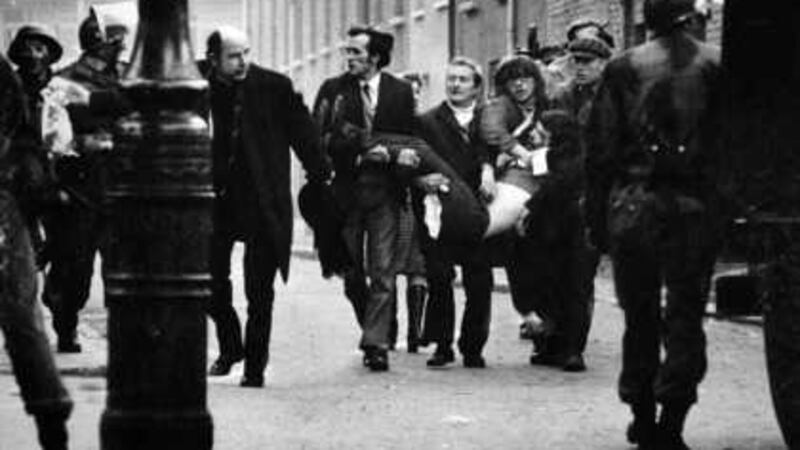It has been a week when the past loomed large both politically and personally for those who still seek answers and justice.
On Monday the Ballymurphy families visited Stormont to hear calls for an independent inquiry into those awful events of over 40 years ago debated. The motion proposed by Sinn Féin was defeated by just four votes but it is testament to the tenacity of those families that their quest for justice has reached this point.
For the second time in as many weeks, I find myself writing about the Alliance Party MLA Trevor Lunn who with his poppy of remembrance firmly placed in his lapel backed the motion for an investigation into the actions of the Parachute regiment in August 1971.
The Lagan Valley assembly member has had quite a time of it of late, changing his mind completely from being firmly against same-sex marriage to voting yes during the last assembly debate. On this occasion discussing the actions of the British army in Northern Ireland his words were very powerful.
For if anyone is to hold a state and its forces up as some kind of heroes then they must also be prepared to accept that if those soldiers' actions led to unarmed men and women being gunned down in the street then they should also be held to account as should their commanding officers who ordered such actions.
On Tuesday, the past was once again was in the headlines with the arrest of a former member of the Parachute regiment in connection with Bloody Sunday. Thirteen people were killed when British paratroopers opened fire on a civil rights march through Derry in January 1972. A fourteenth died later.
The former soldier is the first person to be arrested by detectives investigating the atrocity and is one of the soldiers who gave evidence to the Saville inquiry. The inquiry that took a torturous 12 years to complete exonerated the victims and resulted in Prime Minister David Cameron making a public apology in the Commons.
Kate Nash, whose brother William at just 19-years-old was one of the victims, said the arrest provided a 'flicker of hope' adding she never thought she'd see this day. She's not alone for few families in reality will ever get to the stage the Bloody Sunday families have reached in seeking answers for what happened to their loved ones.
Should any soldier ever be charged and prosecuted with either Bloody Sunday or Ballymurphy they face serving their full sentence due to an anomaly in the Good Friday Agreement legislation.
The release of anyone convicted after two years applies to those who face or would have faced a Diplock non jury trial. This was to differentiate between paramilitary Troubles related murders and domestic killings. However, the introduction of non jury trials only came about with the introduction of the emergency provisions act in 1973, meaning that without an urgent change to the law anyone convicted prior to that risks serving their full jail term.
What that tells a cynic like me is that when the legislation was introduced it was done with the presumption that the past would never be properly investigated in any real detail. No thought was given to what would happen to pre-1973 killings because they were never meant to come before a court.
A further development was the announcement by the Public Prosecution Service that a soldier is to be charged with the attempted murder of a man with learning difficulties over 40 years ago. Dennis Hutchings (74) from Cornwall will face trial for the shooting of John Pat Cunningham in 1974.
And while recent developments may give some comfort to individual relatives they are a sticking plaster over a festering wound of grief, pain, injustice, collusion and hundreds of unsolved murders that in reality will never see the inside of a courtroom.
Judicial justice may be achievable for the few but what is really needed is a political settlement to deal with the past in a way that will be fair and just for the many who are crying out for answers.








